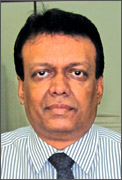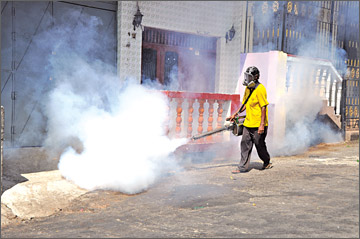CMOH seeks public help to eradicate dengue menace
by Ranil WIJAYAPALA
|

Dr. Pradeep Kariyawasam
|
According to the latest statistics of the Epidemiology Unit of the
Health Ministry 14,844 dengue cases had been reported from all parts of
the country by the end of last month claiming 114 lives. The monstrous
disease had gone beyond the control in some areas despite preventive
measures taken by the Health Ministry, other health authorities and
agencies.
While the Colombo district stands out as the most affected from the
dengue outbreak, the Colombo city has recorded the highest number of
dengue deaths after 20 deaths were reported from the city during the
first eight months of the year.
In June the number of dengue cases reported from the Colombo city
stood at 615, the highest number of dengue cases so far reported from
Colombo.
Maryann Perera, one of the Sunday Observer readers from Dehiwala in a
letter said that the people in Colombo and suburbs are living in great
fear since the death toll from dengue is on the increase. She has
complained to Dr. Pradeep Kariyawasam, Chief Medical Officer of Health (CMOH)
of the Colombo Municipal Council that the stinking drains, stagnant
waters at most poor households in the city have become mosquito breeding
grounds.
Explaining the dengue situation in the city Dr. Kariyawasam said that
dengue is spreading fast due to intermittent rains in these areas. “In
June we had 615 odd cases. Then it came down to 518 in July. But there
was an average of 20 to 30 cases per day reported from the Colombo city.
During the intermittent rains it will go up again,” he added.
However, he came out with the interesting news that the number of
dengue patients in the areas where parapet walls have been demolished
has come down drastically.
 The
parapet walls have been removed from Fort to Dickmans Road including
Cinnamon Gardens and Slave Island. The
parapet walls have been removed from Fort to Dickmans Road including
Cinnamon Gardens and Slave Island.
”Last year when there was a serious epidemic in the Slave Island area
the Security Forces cleared the entire area leaving no room for dengue.
But dengue is spreading in areas such as Borella, Mattakkuliya and Fort.
From where more than 80 percent cases have been reported,” he added.
According to Dr. Kariyawasam the Colombo National Hospital square has
also been affected by the dengue epidemic.
”Basically it is due to waste management and sanitation problem and
uncleaned drains. In some bylanes the garbage disposal is quite poor
although it is not so in the main roads. The situation has turned worse
due to bare lands, large land masses, slums and shanties left unattended
in the city,” he said.
Controlling dengue is not easy because one tea spoon of water is more
than enough for the mosquito breeding. The morning showers can also
create so many breeding grounds.
Mosquitoes come and lay eggs. Sometimes they remain inactive during
dry spells only to re-appear in the next showers. These are the problems
we are facing,”, Dr. Kariyawasam said.
Therefore, as a solution he emphasise the need to have a massive
clean up campaign within two or three days to eliminate the mosquito
breeding grounds.
The Municipality, public sector, private sector, schools and other
institutions should get together and have one or two day clean up
programs to ensure clean drains, canals, gardens, parks and government
and private premises and institutions. Then only we can control the
disease," he added.
The epidemic is there because the number of mosquitoes has grown up
rapidly.
"We are doing our best to control it, but considering the fact that
one female mosquito can lay 300 eggs at a time you can imagine how
difficult it is to control it. Specialists also say that two female
mosquitoes are enough to spread the disease to 100 people. So
controlling the epidemic is surely difficult," he added.
"There are more than 2,000 hospital admissions this year which is a
100 percent increase compare to last year. So we have to end up at 3,500
patients this year," he said.
That is the situation in the Colombo city. The number of deaths is
still on the increase in other parts of the Colombo district and in the
Western Province.
According to Dr. Kariyawasam one major problem that confronts them is
that even the hospitals have become dengue breeding grounds. Those
mosquitoes, the vectors spread the disease from the patients to the
other people. Patients admitted to hospitals for other disease also
contract dengue list they are in hospitals. That was happening in the
Colombo National Hospital during the last two to three years and also at
the Colombo Lady RidgeWay Hospital. "This is a big problem," he said.
"Not only the CMC others to should do their little bit to control
dengue. Unless a natural decline takes place at present it has gone
beyond our control. We are, however, doing our best," he added.
To control the mosquito breeding grounds, the CMC has bought 22 new
fogging machines, making the total number of fogging machines available
with the CMC to 36. "At a meeting had with those operating the fogging
machines, I drew their focus to such areas as Borella, Mattakkuliya and
Fort where dengue is spreading fart. We are now going from one area to
another," he added.
The fogging machines itself cannot solve the problem unless adequate
manpower is made available to use them to fume mosquito breading
grounds.
"We don't have enough labourers earlier. Luckily we had taken 34
labourers under contract basis. But we need 50 more people. There is a
shortage of applicants for this job as it seems to be a very difficult
and risky job. When we said that we need people for these fogging
machines only 16 people were willing to do it," he added.
"They are asking for a risk allowance. They should be given risk
allowance and a proper meal because the chemicals they are exposed to
are very toxic and can absorbed into their skin. That sometimes can stop
the nerve conduction and it affects the heart that and that is the end
of it," he said.
"Most of the people prefer fogging. But fogging is not the answer
because it damages the environment. They must get rid of the breeding
places, solid waste and fill the tree holes with sand, repair the tiny
holes in your balconies and on the concrete slabs which are used as roof
tops. These are the things that you can easily do," he said.
"Get rid of the plants where the water collects. Some people have ten
to twenty banana trees in their tiny plots of lands in the city. Please
have two or four but no 10 or 20. Banana trees are grown together and it
make the places dark and the mosquitoes hide in these places when the
rain water get mixed in the banana leaves which is a good breeding
ground for mosquitoes," he added.
"So we should all get together and work towards cleaning the mosquito
breeding grounds to free the city from the dengue epidemic," he said. |

